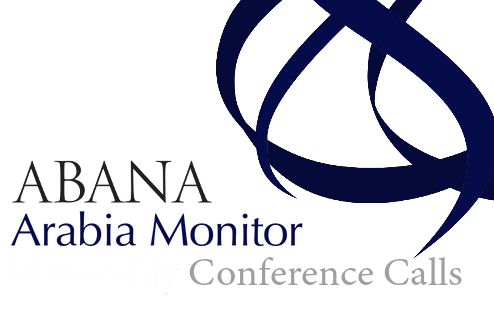
When
January 11, 2019
9:30am - 11:30am
ABANA invites you to participate in our monthly conference call in collaboration with Arabia Monitor.
The ABANA-Arabia Monitor MENA Markets Call
Friday, January 11, 2019
9:30 am (New York, GMT-04:00)
2:30 pm (London, GMT+01:00)
5:30 pm (Abu Dhabi, GMT+04:00)
4:30 pm (Amman, GMT+03:00)
By RSVPing to this call you agree to provide your contact information to Arabia Monitor. Arabia Monitor may contact you directly following the call.
ABANA invites you to participate in our monthly conference call in collaboration with Arabia Monitor. In this month’s call we will discuss the following:
- On the back of riveting recent developments, yet growing opportunities between the MENA region and Turkey, we decided to focus our Q1 2019 MENA Outlook on this relationship. We highlight the economic inroads Turkey has been making into MENA since 2002, and recent rifts between the two sides.
- The IMF’s November Regional Economic Outlook for the MENA region projected GCC growth to recover by 2.4% this year and to rise by a further 3% in 2019, compared with a contraction of 0.4% in 2017. It assumes minimal direct impact from any global trade wars but notes that the region could be affected by lower growth in its key economic partners, a slowdown in global growth as well as worsening emerging market sentiment.
- In the UAE, GDP growth is projected to rise from 0.8% in 2017 to 2.9% in 2018 and 3.7% in 2019. Meanwhile the Saudi economy is expected to grow by 2.2% in 2018 and 2.4% in 2019 from a contraction of 0.9% in 2017. GDP growth in Bahrain, Kuwait, Oman and Qatar are projected at 2.6%, 4.1%, 5% and 2.8% respectively next year. Reflecting the expected impact of re-imposed sanctions on Iran, growth in non-GCC oil exporters (such as Iraq) is projected to slow to 0.3% in 2018, down from 3% in 2017, and to pick up modestly to 0.9% in 2019. Renewed sanctions are set to reduce Iranian oil production and exports significantly over the next two years at least.
- Growth in regional oil-exporting countries troubled by internal conflict has been mixed. While Libya’s growth has been strong in 2017 and 2018, primarily driven by increased oil production, activity in Yemen contracted further. The outlook for these countries is expected to improve if the conflicts subside, so we are carefully monitoring the encouraging peace initiative underway for Yemen and hoping for better momentum in Libya.
- Political events to watch for in 2019 will be Algeria’s preparations for new elections that appear to once again field Bouteflika, Lebanon’s cabinet formation travails as ratings pressure emerges, Iraq’s cabinet formation as public service provision continues to suffer, and Saudi Arabia’s critical redoubling of efforts to reinforce the economic and political initiatives of the Crown Prince, to keep reform forging ahead. How the Iranian regime absorbs domestic and international pressure will also be crucial to observe.
- In the meantime, we expect the unfolding new silk route to continue to hum along unperturbed, virtually inexorably, via the Belt and Road Initiative (BRI). We are expanding our presence in China through 4 additional analysts on the ground. We have also inaugurated coverage of Somalia and Djibouti, countries that are part of both the Arab and BRI maps.
- While we couldn’t start to predict what the MENA region will bring in 2019, just as some of the events of 2018 were impossible to even imagine, we know there won’t be a single boring moment ahead!
The ABANA-Arabia Monitor Monthly Conference Call Series is led by Arabia Monitor’s CEO and Chief Economist Dr. Florence Eid-Oakden, a respected authority on the economy and geopolitics of the MENA region. Dr. Eid-Oakden is joined by a team of analysts to provide insights into emerging issues in and affecting the region. Calls are open to all ABANA members.
*Please note that the title and content of the call are subject to change to reflect and include the most recent events affecting the region.
**The call will not be recorded

